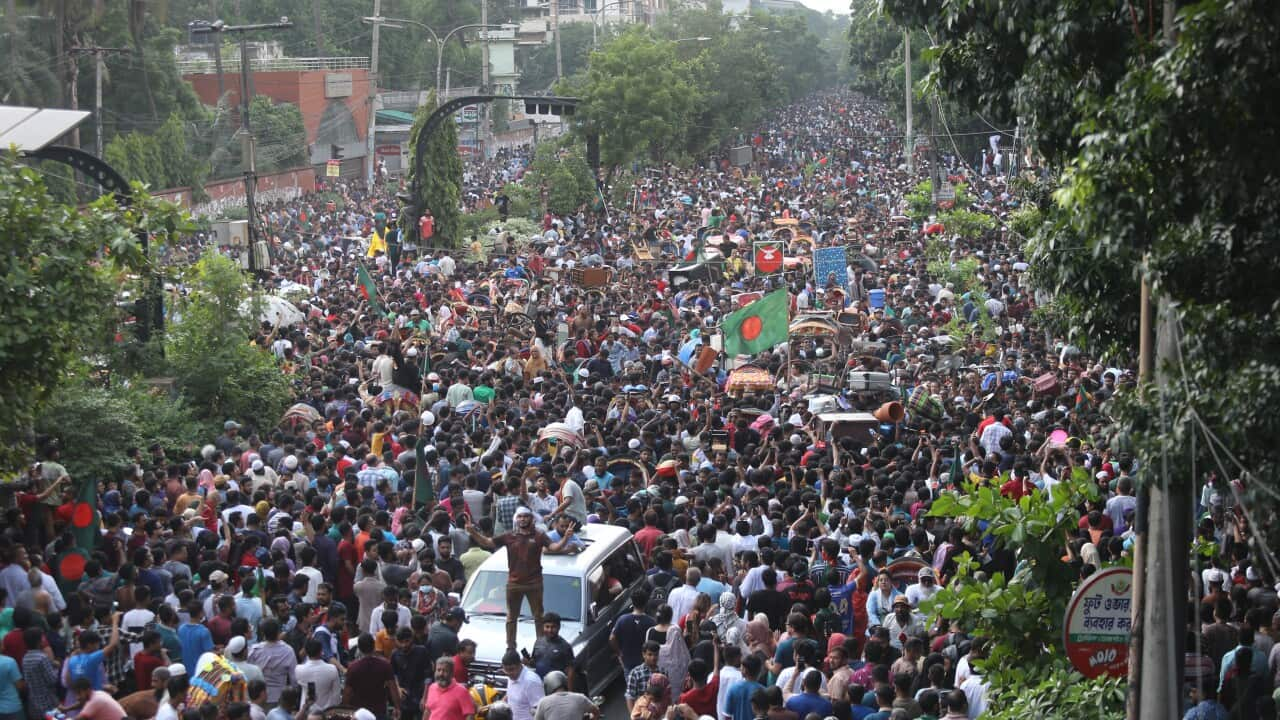TRANSCRIPT
Bangladesh's Prime Minister Sheikh Hasina, who has dominated the country's politics for over two decades, has officially resigned following weeks of intense anti-government protests.
The protests have been marked by increasing violence and widespread unrest.
Bangladesh's Army Chief, Waker-uz-Zaman, confirmed Ms Hasina's resignation and assured the nation that the military is working closely with President Mohammed Shahabuddin to ensure a smooth transition of power.
“I had invited the leaders from all political parties and we had a discussion. We have decided to form an interim government. The country will be now run by an interim government. We are now going to meet the honourable President and will discuss about the formation of the interim government under which the country is going to run as of now."
Meetings with opposition leaders, particularly from the Bangladesh Nationalist Party, are ongoing.
However, the leadership of the interim government remains undecided.
General Waker-uz-Zaman has promised a smooth and peaceful transition.
“Please keep faith and trust in the army. I take the responsibility and I promise to protect the lives and property of the people. Don't lose faith in the army. God willing! We will fulfil your demands and bring peace and harmony back to the country. I request to you all to support the army and stop the violence, murders, hooliganism and the protest."
As Ms Hasina fled, large crowds gathered in defiance of a nationwide curfew to march to the Bangladeshi city centre of Dhaka, a day after protests in the capital killed at least 91 people and left hundreds injured.
This protestor was among the crowd.
“We are heading towards Ganabhaban to see if Hasina is still there. The 16 years of autocracy is coming to an end."
From there, the situation quickly escalated as crowds arrived at, and stormed Ganabhaban, the Prime Minister’s official residence, looting it and setting fires on its grounds.
Ms Hasina was not there.
Reports indicate she landed in India on Monday, though her final destination remains uncertain, with some sources suggesting she might head to Dubai.
According to BBC reports, the crowd at the residence tore down a statue of the former Prime Minister's father, Sheikh Mujibur Rahman, in a symbolic act of defiance.
Video shows a ladder propped up against the statue, with three men atop it, one chiseling away at its head with a mallot.
The once-imposing residence is now being dismantled by the enraged masses.
Human Rights Watch Asia Deputy Director Meenakshi Ganguly says "the people have won".
“A lot of people have lost their lives in this fight, which really began peacefully over quotas in government jobs, but escalated because of mishandling by the government, by the absolute arrogance of the political leadership, by excesses of the security forces into something which was so angry and demanded that the prime minister, step down, so they will be happy today."
In response to the unrest, Bangladesh's international airport was temporarily closed for six hours last night. ((Mon))
The hub is expected to reopen soon.
The airport closure was part of a broader effort to manage the chaos and ensure public safety.
The United Nations spokesman Farhan Haq has called for "restraint" and urged that the formation of an interim government in the South Asia nation be democratic.
“For us, the important things are for the parties to remain calm, and we want to emphasise the importance of a peaceful, orderly and democratic transition. We stand in full solidarity with the people of Bangladesh at this time, and we call for full respect of their democratic and human rights and ultimately, regarding what's happened so far, there's a need for a full, independent, impartial and transparent investigation into all acts of violence."
Amidst the turmoil, there's a bit of good news for Bangladeshi citizens.
3G and 4G networks have been reinstated, allowing people to access internet services and stay informed as the government transition unfolds.
Meanwhile, President Shahabuddin has ordered the release of jailed former Prime Minister Khaleda Zia and all students detained during recent protests against the government job quota system.













